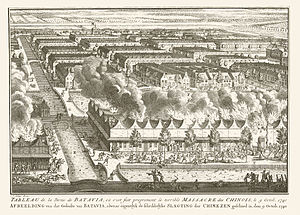
Back Sinofobie Afrikaans رهاب الصين Arabic Sinofobiya Azerbaijani চীনাভীতি Bengali/Bangla Sinofobia Spanish Sinofobia Basque چینیستیزی Persian סינופוביה HE चीन-विरोधी भावना Hindi Sinofobia ID

| Part of a series on |
| Discrimination |
|---|
 |

Anti-Chinese sentiment is an irrational fear or dislike of China, Chinese people and/or Chinese culture; it is also referred to as Sinophobia.[1][2][3][4] The relative economic success of ethnic Han Chinese minority in SE Asia has made them the object of envy and even resentment-driven violence[5][6]. Furthermore, the rise of China and the fear of it overtaking the US has fueled visceral alarmism and China-threat theories[7]. Persistent negative media coverage of China, driven in the main by policymakers and politicians[8], has contributed greatly to anti-Chinese sentiment. This has taken the form of selective coverage of events and the use of negative tones and frames[9].
It is frequently directed at Chinese minorities which live outside China and involves immigration, nationalism, political ideologies, disparity of wealth, the past tributary system of Imperial China, majority-minority relations, imperial legacies, and racism.[10][11][12][note 1]
A variety of popular cultural clichés and negative stereotypes of Chinese people have existed around the world since the twentieth century, and they are frequently conflated with a variety of popular cultural clichés and negative stereotypes of other Asian ethnic groups, known as the Yellow Peril.[15] Some individuals may harbor prejudice or hatred against Chinese people due to history, racism, modern politics, cultural differences, propaganda, or ingrained stereotypes.[15][16]
- ^ Sinophobia is "Fear of or contempt for China, its people, or its culture" states The American Heritage Dictionary of the English Language, Online Edition. Retrieved July 12, 2012.
- ^ Macmillan dictionary. Retrieved July 7, 2022.
- ^ The Free Dictionary By Farlex. Retrieved July 7, 2022.
- ^ Collons Dictionary. Retrieved July 7, 2022.
- ^ hksspr (January 31, 2024). "Chinese-Indonesians Face Long Road to National Integration, Except During Elections". HKS Student Policy Review. Retrieved July 11, 2024.
- ^ "Minority Rights - Chinese in the Philippines". Minority Rights.
- ^ "China Threat or Peaceful Rise? NY Times".
- ^ Harris, Lee (February 9, 2022). "Congress Proposes $500 Million for Negative News Coverage of China". The American Prospect. Retrieved July 11, 2024.
- ^ London, King's College. "Shaping the policy debate: How the British media presents China". King's College London. Retrieved July 11, 2024.
- ^ Cite error: The named reference
bbcindonesiawas invoked but never defined (see the help page). - ^ Cite error: The named reference
heraldsunwas invoked but never defined (see the help page). - ^ Cite error: The named reference
kazinwas invoked but never defined (see the help page). - ^ Chih-yu Shih; Prapin Manomaivibool; Reena Marwah (August 13, 2018). China Studies In South And Southeast Asia: Between Pro-china And Objectivism. World Scientific Publishing Company. p. 36.
- ^ 紀紅兵; 內幕出版社 (August 25, 2016). 《十九大不准奪權》: 反貪─清除野心家 (in Chinese). 內幕出版社. ISBN 978-1-68182-072-9.
... 第三點,作為獨立學者,與您分享下本人"反中不反華"的觀點。
- ^ a b William F. Wu, The Yellow Peril: Chinese Americans in American Fiction, 1850–1940, Archon Press, 1982.
- ^ "Conference Indorses Chinese Exclusion; Editor Poon Chu Says China Will Demand Entrance Some Day – A Please for the Japanese – Committee on Resolutions Commends Roosevelt's Position as Stated in His Message". The New York Times. December 9, 1905. p. 5. Retrieved February 21, 2010.
Cite error: There are <ref group=note> tags on this page, but the references will not show without a {{reflist|group=note}} template (see the help page).
© MMXXIII Rich X Search. We shall prevail. All rights reserved. Rich X Search